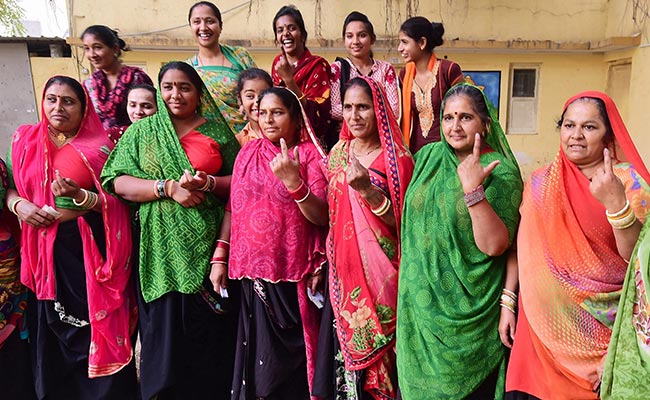Ahmedabad: Gujarat saw 68 per cent tentative voter turnout in the first phase of assembly elections held in Kutch, Saurashtra and south Gujarat today, the Election Commission said. This is lower than last time's 71.3 per cent for the whole state. Finance Minister Arun Jaitley said the BJP's ground reports "are very encouraging and suggest that the party has been backed by every section of the society and is set for not just a comfortable win, but a landslide victory".
Here is your 10-point guide to the first phase of the Gujarat Assembly Elections:
- Voting was held today in 89 constituencies. Voting in the second phase for the remaining 93 of the state's 182 constituencies will be held on Thursday next. To form the government, a party needs to win at least 92 seats in the assembly. Results will be announced on December 18.
- The Congress' Randeep Surjewala said "heavy polling" like today's is usually seen as a vote for change, asserting that the Congress will form government in Gujarat after 22 years of BJP rule. Gujarat had, however, bucked that trend in the last election - the 71.3 per cent voter turnout was the highest since 1980 - by electing the BJP back for a fourth term.
- The Congress' Ahmed Patel asserted that his party will win and said that there can "only be a hitch if there are problems with the EVM or any mischief." He was referring to reports of faulty electronic voting machines or EVMs in some parts of the state.
- Arun Jaitley described the Congress' allegation on EVMs as an "alibi in preparation for a possible defeat". The minister said there were some incidents, which is "expected in such a big election".
- The Election Commission said a little over 0.5 per cent of the total ballot units and control units - which make up the EVM - had to be replaced during voting. That is about 181 ballot units and 223 control units, apart from 714 VVAPT or the voter verified paper audit trail machines. "Overall the number looks large but as a proportion of the total very few machines were found faulty. They were replaced," the panel said.
- The Gujarat election is seen as a Prime Minister Narendra Modi vs Congress vice president Rahul Gandhi duel, with both leading their parties from the front in an aggressive, often bitter and personal campaign, to win the crucial state ahead of the national election in 2019.
- While the BJP has in past elections dominated the areas that voted today - it holds 67 of the 89 seats - Saurashtra and Surat are seen as strategically vital in this election because they have a large number of Patels or Patidars, an influential caste reportedly upset with the ruling party. Young Patidar activist Hardik Patel has asked his community to reject the BJP for failing to extend affirmative action policies to them.
- Saurashtra and Kutch also have the maximum number of constituencies that voted today and the party that wins the most seats in these regions will be seen to have a headstart.
- Rahul Gandhi has partnered with Hardik Patel and Dalit leader Jignesh Mevani, also inducting backward caste (OBC) leader Alpesh Thakore into his party, in an attempt to consolidate votes of communities seen to be upset with the ruling BJP.
- In Surat, the diamond and textile hub that has 12 assembly seats, Mr Gandhi urged traders to punish the BJP, alleging that PM Modi's mega reforms notes ban and new national tax GST have brought small business to their knees. Union ministers Arun Jaitley and Smriti Irani defended the GST and demonetisation, trying to allay the concerns of the traders.




